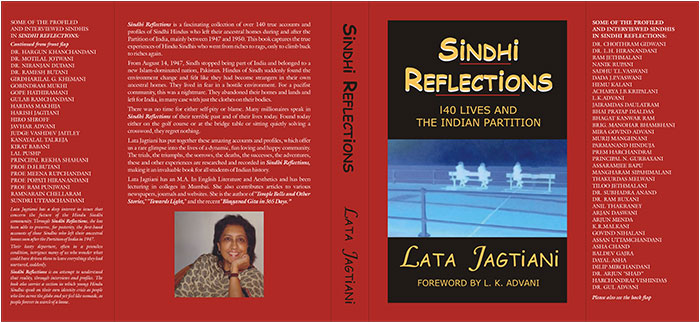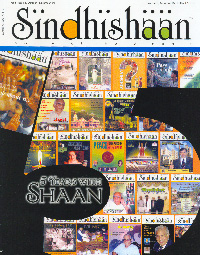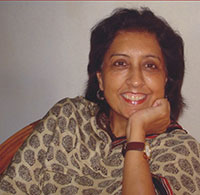SINDHI REFLECTIONS
Excerpts from the Introduction to
SINDHI REFLECTIONS
140 lives and the Indian Partition

Some of the profiled and interviewed Sindhis in Sindhi Reflections:
Dr. Choithram Gidwani, Dr. L. K. Hiranandani , Ram Jethmalani, Nanik Rupani, Sadhu T. I. Vaswani, Hemu Kalani, Acharya J. B. Kripalani , L. K. Adwani, Jairamdas Daulatram, Bhai Pratap Daildas, Bhagat Kanwar Ram, Brig. Manohar Bhambhani, Mira Govind Adwani, Murij Manghnani, Parmanand Hinduja, Prem Harchandrai, Principal N. Gurbaxani, Assaramjee Bapu, Mangharam Sipahimalani, Thakurdas Melwani, Tiloo Jethmalani, Dr. Subhadra Anand, Dr. Ram Buxani, Anil Thakraney, Arjan Daswani, Arjun Menda, K. R. Malkani, Govind Nihalani, Assan Uttamchandani, Asha Chand, Baldev Gajra, Dayal Asha, Dilip Mirchandani, Dr. Arjun “Shad”, Harchandrai Vishindas, Dr. Gul Adwani, Dr. Hargun Khanchandani, Dr. Motilal Jotwani, Dr. Niranjan Dudani, Dr. Ramesh Butani, Girdharilal G. Khemani, Govindram Mukhi, Gope Hathiramani, Gulab Ramchandani, Hardas Makhija, Harish Jagtiani, Hiro Shroff, Javhar Adwani, Judge Vashdev Jaitley, Kanayalal Talreja, Kirat Babani, Lal Pushp, Principal Rekha Shahani, Prof. D. H. Butani, Prof. Meena Rupchandani, Prof. Popati Hiranandani, Prof. Ram Punjwani, Ramnarain Chellaram, Sundri Uttamchandani.
Lata Jagtiani has a deep interest in issue that concerns the future of the Hindu Sindhi community. Through Sindhi Reflections, she has been able to preserve, for posterity, the first-hand accounts of those Sindhis who left their ancestral homes soon after the Partition of India in 1947.
Their hasty departure, often in a penniless condition, intrigues many of us who wonder what could have driven them to leave everything they had nurtured, suddenly.
Sindhi Reflections is an attempt to understand that reality, through interviews and profiles. The book also carries a section in which young Hindu Sindhis speak on their own identity crisis as people who live across the globe and yet feel like nomads, as people forever in search of a home.
Sindhi Reflections is a fascinating collection of over 140 true accounts and profiles of Sindhi Hindus who left their ancestral homes during and after the Partition of India, mainly between 1947 and 1950. This book captures the true experience of Hindu Sindhis who went from riches to rags, only to climb back to riches again.
From August 14, 1947, Sindh stopped being part of India and belonged to a new Islam-dominated nation, Pakistan. Hindus in Sindh suddenly found the environment change and felt like they had becomes strangers in their own ancestral homes. They lived in fear in a hostile environment. For a pacifist community, this was a nightmare. They abandoned their homes and lands and left for India, in many case with just the clothes on their bodies.
There was no time for either self-pity or blame. Many millionaires speak in Sindhi Reflections of their terrible past and of their lives today. Found today either on the golf course or at the bridge table or sitting quietly solving a crossword, they regret nothing.
Lata Jagtiani has put together these amazing accounts and profiles, which offer us a real glimpse into the lives of dynamic, fun loving and happy community. The trials and triumphs, the sorrows, the deaths, the successes, the adventures, these and other experience are researched and recorded in Sindhi Reflections, making it an invaluable book for all students of Indian history.
Lata Jagtiani has an M.A. in English Literature and Aesthetics and has been lecturing in colleges in Mumbai. She also contributes articles to various newspapers, journals and websites. She is a author of “Temple Bells and Other Stories,” “Towards Light,” and the recent “Bhagavad Gita in 365 Days.”
“A little while and you will have forgotten everything:
a little while and everything will have forgotten you” - Marcus Aurelius
“Somebody should write about our Sindhi elders and their Partition experiences before we lose that history forever.” This is what many Sindhis were saying until last year. I wondered why nobody was writing a book on the experiences of Hindu Sindhis. The subject kept re-surfacing online. From Dr. Nargis Awatramani (USA) to Govind Jhangiani (U.K) from Arjan Daswani (Singapore) to Shewak Nandwani (Thailand), the question was practically a refrain. In Mumbai, it was me saying--Somebody, write the book before its too late! But there were no volunteers.
I began work. Now that I have collected true stories of Hindu Sindhis, do read the book and preserve it for generation next. This is a serious work of research, of historical significance for all Hindu Sindhis.
The journey through this book has been interesting, to say the least. Sometimes, to my surprise, I met total strangers who welcomed me warmly, at other times, with sadness I interviewed elders with multiple aeging troubles; and then, I met many who were too cynical to “waste their time” being interviewed for something which promised no monetary returns. Access to the rich and famous was often blocked off by over-zealous secretaries. One day I was shocked, another day delighted and on a third day, depressed, it was a real roller coaster. I often asked myself why I should continue. I lost count of recorded interviews that became useless with one phone call. One 85-year old told me of all the mischief he had done, after the Partition. He became embarrassingly rich, divorced his wife, and sailed through life. I watched him agape, as he really walked into the sunset with a spring in his step, towards his girl friend and chauffeur-driven expensive car. I wrote the account out, and a week later, he said he would prefer to keep his life private.
I kept my focus on ordinary Hindu Sindhis and their experiences during the Partition. However, these 100 plus accounts and profiles are a very small number when one compares it with the 12, 25,000 Hindu Sindhis evacuated from their homes between 1947 and 1950. I am one of those who believe that big oak trees grow from small acorns, and I offer you my tiny, hopeful acorn of a book.
Subjected to communal cleansing in Sindh, with the tacit compliance of Jinnah’s Muslim League, most Hindu Sindhis had only one option: leave. A friend told me the story of a Papadawaree (a lady who sells Papads door-to-door). She was a woman living in Sindh and had several children. Her teenaged daughter was sitting outside in the back of the house, sunning herself and wara paee sukaye (drying her wet hair.) Suddenly there were shouts, telling the woman to run, there were riots, and people were coming for them. Along with her several children, she ran to the station, practically with one chappal, and boarded a train leaving Sindh. However, it was only on the train that she noticed the absence of her teenaged daughter. It was already too late. What happened to the girl? For long, nobody knew. Then years later, she got news. A Muslim family had adopted the abandoned teenager, raised her to become a well-established doctor. A meeting was arranged between the daughter and the mother in Ulhasnagar. After the initial joy at the re-union, they parted and returned to their lives, the mother back to selling papads in India while her daughter healed the ill in Pakistan.
I read a story by a writer, Wali Ram, about one Viundri Tejomal from Hyderabad Sindh, who had written a note in Sindhi and hidden it her cupboard before rushing away from home. The note read: “Vundri Tejomal jo hee kabat jeko kholeendo, un khi pap lagando.” (Opener of this Vundri Tejomal’s cupboard will be sinning.) Who was she and what became of her during and after the Partition?
This is a mystery. Inside the note, it appears she expressed a desire to return home to take care of her personal belongings. She might had left her things behind, packed quickly and left the note behind.
Another family that was torn asunder was that of Maama Rupachand Mahtani, a close in-law who had another story. He wanted to cross over to India, but his wife didn’t. She and their sons remained in Sindh while he crossed the border. His children went on to become highly qualified professionals, but weren’t too keen on meeting with their father. In Mumbai, Maama Rupa’s life was full of interesting twists and turns. He was an impish gypsy who spread his grin and jokes from Sindhi home to Sindhi home. He charmed ladies with poetical lines from Shakespeare alternating them with absolutely witty and wicked jokes. He had the Dev Anand debonair air about him and he was a hit with both sexes. He praised their cooking in his tobacco-laden voice, listened attentively to the men, and hugged children affectionately. He brought the house down everywhere. Once he admitted that he missed his family, in a moment of candour, before taking refuge behind his favourite line with a twinkle in his eye, “Sigh no more, man, sigh no more, women were deceivers ever!”
I believe Hindu Sindhis are a wonderful community of survivors. I have presented the journey of this brave and strong Hindu community, forced into poverty and terrorized out of home and hearth. These Sindhis stepped out of inhospitable barracks, wore brave smiles when they went in search of work in new, strange lands. Many had a zero balance after they left Sindh; today, it might be difficult to count the number of zeroes in most of their balance sheets. If the Sindhi community ever gets a listing on the New York Stock Exchange, it would surprise me if Warren Buffett isn’t amongst its first investors. Sindhi Hindus are multi-baggers all right.
I would like to add that our elders left Sindh not out of cowardice but in fact, they chose wisdom over foolhardiness--they faced an unpleasant reality and did what was necessary for survival. Imagine a USA and UK where 75 percent of the population is Muslim and the government is Muslim as well. Even George Bush and Tony Blair would run for cover. How could 22 percent Hindus stand up to 75 percent Muslims? And then, matters were deteriorating by the day, with Hindus decreasing and Sunni Muslim numbers rising. When the mayhem began, survival was all everything.
Had Netaji Bose and Sardar Patel been at the helm of national affairs, to my mind, the Muslim League would have failed. The British played their divide-and-rule to the hilt, Jinnah played his, “We are different, we are Muslim” tune, Gandhiji undemocratically by-passed Patel to hand over power to Nehru, and the rest is history. Nehru told Sindhi journalists “Partition, yeh sab bakwas hai!” (Partition, this is all rubbish!), Gandhiji also stated that Partition would take place over his dead body. These remarks lulled Hindus into a dangerous complacency. Finally, when things got ugly, Hindu Sindhis left.
The Sindhi Hindus paid the highest price. Gandhiji’s idealism was expressed when he said, “Aap baithe raho aaram se!” (You stay in Sind, without fears!) In Bombay, Morarji Desai, wanted the refugees to stay on the outskirts of the city and not come into Bombay, treating Sindhis as pariahs or pollutants. Nehru, on his part, admitted he felt little for Sindhis, when he said, “I don’t know Sindh. I don’t feel attracted to it.’’ In a letter he wrote, “The Sindhi people have their good qualities and I rather like them. But they are a curious mixture of the Muslim feudal classes and the Hindu bania class, neither very admirable, as classes go. Still they have push and energy and that is something to be thankful for. They seem to be singularly devoid of any artistic sense. And the colour they sport in their striped pajamas are a trial.” If he had tears, Nehru wasn’t prepared to waste them on Sindhi Hindus, as Dr. Choithram Gidwani, a Congress leader, discovered, to his dismay.
We went from being a prosperous community, to the new untouchables. There was a push from within--the Muslim League and the Mohajirs wanted us out, and there was a push from without—Indians found us, “chee”(yuck) and a needless burden. Hindu Sindhis were inconvenient on both sides of the border. Who can call the great Sadhu Vaswani a coward? Even a wise man of spiritual depth, had to leave Sindh along with Dada J.P. Vaswani. Can we entertain any doubts on this subject after reading their story?
Doors of Hindus were marked with a red cross, making Hindus sitting ducks for fortune-seekers. Hindus watched as armed bands of people roamed the streets, crying, “Hindu ko maro!” (“Kill the Hindu!”) All weapons had been surrendered to the government by law, so, self-defense was out. Muslims went to Hindu homes and business premises, with documents declaring them as “Intending Evacuees.” They had to vacate since the authorities had chosen to assume they were “intending” to leave; therefore, they had no business to continue living there. Nobody knew on what fact the assumption was rooted, nobody knew who was next. Everything Hindu was up for grabs.
Many Sindhi Muslims protected their Hindu neighbours from attacks by Mohajirs; but there are also stray instances of those that gleefully occupied their homes. Sadly, their glee was short-lived since they soon had to surrender their gains to the Mohajirs. Sufis at heart, many Sindhi Muslims saw their neighbours depart with a tear in their eye.
Now where are the Sindhi Hindus? Rootless, we were now a community, which chose to blend, adapt, and wear masks. We succeeded, full marks to Sindhi Hindus. But, now that we have, why do we continue with those useless masks? Do we have to change our names and surnames? Are we flattered if somebody mistakes us for Punjabis or Parsees? What’s wrong with us? If Narayan Murthy and Azim Premji can make it in the world with their difficult names, can’t we do the same with ours? But we want to say to the world-- Look, look, I am like you, I am not a Sindhi.
And so Harry (Hariram) cries over the shoulder of Sally (Sundari), “Sally, why do Sindhis lack culture?” Sally replies, “Charyo thyo aahen, (are you mad) naturally, it’s all about money, Harry!”



